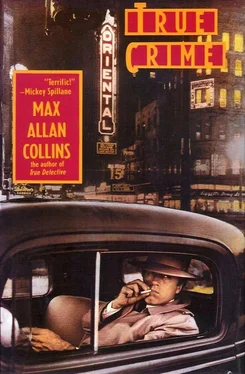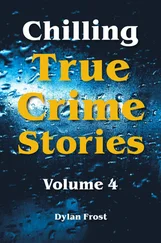Campagna reached over and shut the door for the fat little man, who put his hat on and was going past me when I said, “How you doing, Willie?”
Willie Bioff squinted behind his wire-frames, then said, “Heller?”
“That’s right.”
He smirked. “How’s it feel to be an ex-cop?”
“How’s it feel to be an ex-pimp?”
The smirk shifted to a sneer. “Once a smart-ass always a smart-ass.”
“Once a pimp always a pimp.”
Bioff thought about doing something about my mouth. I knew he wouldn’t. He was a former union slugger, but known for doing his slugging with a blackjack from behind. And in his pimp days he was famous for slapping his whores around. I’d arrested him, back in my plainclothes days, for that very act. Right before I was assigned to the pickpocket detail, I’d accompanied one of Chicago’s honest detectives, William Shoemaker, “Old Shoes” himself, on a brothel raid. We’d caught Willie going down the back stairs with a tally sheet, and when we hauled him back upstairs and one of his girls admitted Willie was her pimp, he’d hauled off and slugged her. We got a six-month conviction on the little bastard, but he never served it. Chicago.
Bioff was still standing there, trying to decide if he should get tough — maybe thinking Campagna would back him up. But then Bioff had no way of knowing why I was present; maybe I was on Nitti’s team, too, and he better not risk messing with me. He was nothing if not a coward.
Bioff said, “We should let bygones be bygones,” and waddled quickly off.
“I hate that little pimp,” I said.
Campagna looked at me impassively, then his tight mouth turned up at one corner. I took that to be a sign of agreement, and a possible softening of the tension between us. Still, if Nitti ever wanted me dead, Campagna would probably push to the front of the line to get the job.
For now he pointed one of his shotgun-barrel fingers at me and said, “Wait here — I’ll see how Frank’s doing.”
I waited; it was just a matter of seconds and Campagna was back, saying, “Frank wants to know if your business is private.”
“Pardon?”
Campagna looked faintly disgusted again. “Can you talk in front of anybody, or is it for Frank’s ears only?”
“Frank’s ears only,” I said.
Campagna nodded and went back in, came right out, said, “It’ll be just a few minutes. Frank’s getting a haircut.”
“Oh,” I said.
We stood there for a while, on either side of the door.
Suddenly Campagna said, “Me, too.”
“What?”
“I hate that little pimp, too. Bioff. You want a cigar?”
“Uh, no thanks.”
Campagna took out a cigar as thick as one of his fingers and lit it. It smelled pretty good, as cigars go. There were guys all over town who’d give their soul for a job that paid per day what that cigar cost.
Not that I blamed Campagna for enjoying himself; in his business, life was sometimes short — why not enjoy it while you had it? And I was grateful for the gesture he’d made — some human contact between me and him, however slight, might be good for my health. At least now I didn’t figure he’d be wanting to be first in line to bump me off.
The door opened suddenly and a white-smocked, skinny, swarthy man with a pencil-thin mustache and slick hair came rushing out, saying “’Cusa, ’cusa,” and shutting the door quickly behind him. Something smashed against that door — something glass, shattering.
The man, a barber apparently, seemed frightened but Campagna stopped him before he could run away and gave him a fin, saying, “You’re lucky to get it.”
The barber nodded, his eyes wide, terrified, and scurried off down the hall.
Campagna, his mouth turned up at either corner, genuinely amused now, pointed a thumb at the door and said, “Frank said you could go in as soon as his barber came out. So you can go on in, Heller.”
I swallowed. “You’re too good to me, Campagna.”
Campagna actually grinned for a moment — the first indication I’d had since knowing him that he had teeth — and opened the door and I went inside.
Glass shards from a small hand mirror crunched under my feet as I entered the plushly carpeted living room of the suite. Nitti was standing looking in a wall mirror, a white barber’s gown tucked in his collar; he was touching his hair, looking at himself with disapproval.
“Come in, Heller,” he said, not looking at me. “Find a seat.”
There was a high-backed chair near a sofa in this white-appointed, gold-trimmed, rather Victorian-looking suite. Black hair trimmings peppered the white carpet near the chair, so I sat on the sofa.
Nitti yanked the white gown from under his neck and pitched it behind him as he walked over to the chair and sat, placing his hands on his knees. He was in gray pants and a white shirt. His suitcoat and tie were on a coffee table nearby, but he didn’t put them on. He was shaking his head.
“They don’t make ’em like they used to,” he said.
“Uh, what’s that, Frank?”
“Barbers. That little cocksucker makes more money off me in fifteen minutes than I got in a week, when I was in the business, and look what he does to me!” He gestured to his immaculately cut black hair, slicked back, parted at the left, perfect.
“It looks pretty good to me, Frank.”
“Does it? Well, maybe I’m too fussy. That’s the fifth barber I tried this year. And they all got the same goddamn problem.”
“What’s that?”
“Their goddamn hands are shaking! Look—” He bent over and tipped his head to one side, folded his ear back; a little red showed. “I’m fuckin’ bleeding! They ain’t barbers, they’re butchers! In my day, a barber had hands like this —” And he held his hands out straight in front of him and demonstrated how rock-steady they were.
“Maybe they’re intimidated, Frank.”
That seemed to confound him. “What the hell for?”
“Well,” I said. “They’re cutting Frank Nitti’s hair. There’s a certain amount of pressure in that, don’t you think?”
He thought about that, nodded. “I never thought of it. But you’re right, Heller. It could make a barber nervous, knowin’ he’s cuttin’ another barber’s hair. You may be right. Now.” He slapped his knees. “What’s this about?”
“I’m here for a favor — if you’re willing to grant one.”
He shrugged expansively. “You know I owe you, kid. From way back.”
“Well, I don’t figure you owe me. But if you’d do this for me, I could maybe owe you.”
“You don’t sound nuts about owing me, kid.”
I admitted I wasn’t. “I would like to ask that if you ever call my marker in,” I said, “you’ll restrict it to more or less legal services. Maybe sometime you could use some investigating and wouldn’t want to use your own people — something on the q.t. I could be your man. No fee, no questions asked.”
He nodded, smiling rather absently, almost to himself. “Maybe I ought to quit thinking of you as a kid, Heller. You seem to’ve grown up on me, when I wasn’t lookin’.”
I smiled at him. “You’re always looking, Frank.”
He laughed, the haircut forgotten. “You got that right. Look, I am grateful to you for that last little job you did for me.”
I didn’t know what he meant; I didn’t say so, but he could see it in my face.
“You know,” he said, gesturing with one open hand. “When I gave you that C to mind your own business.”
He meant Dillinger; I was wearing the suit I’d used part of the money on.
“That’s okay, Frank.”
“You coulda gone to the papers, coulda found some news-hound who’d paid you good dough for your story. I ain’t sure anybody woulda believed you, but it’s nice that story never got told. Coulda made a ripple or two in the lake. And ripples can turn into waves, if you ain’t careful.”
Читать дальше












